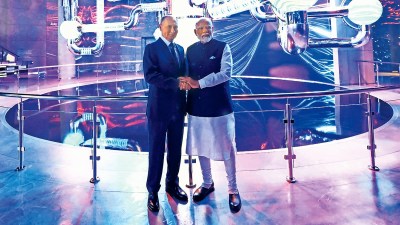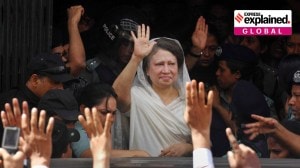People146;s media?
CPM wears no clothes. But the blunt truth is that there is a quiet crisis of credibility facing the Indian media.

It is a great pity that the CPM is the only party that has raised an important set of issues concerning India8217;s democracy: the state of our media. The media is often targeted for various reasons, usually for its ideological biases. But the CPM has gone a step beyond the usual pantomime of media and politics. It has returned the compliment that it often receives from the press, that it is beholden to foreign powers. And it has called for greater regulation of the media on many dimensions.
There are some serious issues here, but the CPM8217;s advocacy of these issues is a great pity in a double sense. For one thing, many of the CPM8217;s regulatory proposals on issues like foreign ownership of the media are more about control than about creating a healthy media. But more importantly, the CPM has very little locus standi on the issue. After the Nandigram episode, its mouthpieces and intellectuals were in full swing, denouncing anyone who dared criticise it as acting at the behest of imperial powers to delegitimise the Left. A party that is more concerned with protecting its own rather than respecting the truth, a party that is prone to interpret all genuine ideological difference as a conspiratorial plot, is unlikely to be a credible spokesman on media issues.
The CPM is vulnerable on these issues and the media will predictably, jump all over it, obscuring some real issues, like the ways in which cross-ownership promotes unhealthy concentration in the media. But this would be a shame. For the blunt truth is that there is a quiet crisis of credibility facing the Indian media. And the media is living in a fool8217;s paradise if it mistakes resisting the Left with putting its own house in order.
On the surface, there is a simple story about accountability in Indian media. On this view, there is competition; and competition, we assume, produces accountability. But competition alone does not work on many dimensions. Running a newspaper is a financially complicated business. This is particularly true in a country like India where newspaper readers are not willing to pay anything close to the costs of producing quality news. The rest will have to be subsidised by activities like advertising revenue.
Although related, competition for advertising revenues is not the same thing as competition for the needs of readers. Both have different logics. There is a sense in which intellectual ambition is a genuinely public good, but is under-supplied by the market. The Indian media cannot be accused of a lack of diversity of opinion; equally it cannot be accused of having high intellectual, professional or aesthetic ambition for its outputs. In many countries the public broadcasting system did provide a genuine outlet for taste, intellect and a genuine sense of distinction that society needs. But our public broadcasting system was ruined by the logic of politics and patronage. There is a case to be made that despite competition an important class of public goods remains under-supplied.
But the really important place competition has failed is in accountability of the media itself. While mutual contention and differences between news media are fine, that contention has to have some minimal baseline credibility. It is a measure of the declining credibility of the media that almost no paper is widely regarded as a journal of record. As someone once put it, there are often more subtexts than texts. But to invoke competition to scuttle the debate over media accountability is a bit like saying that because politics is competitive, politicians don8217;t need to be held accountable to other constituencies. In some ways, politicians at least have a go at each other. But when was the last time the media had a competition over holding each other accountable? This could be for many reasons: an exalted sense of guild solidarity or an acute consciousness that they are all living in glass houses. Competition does not lead media to hold each other accountable.
This point has come home in a story that should be a frontline scandal in any democracy. A couple of newspapers have been reporting on an open secret of the media, the existence of private treaties. Under these, media houses invest in companies, which then receive favourable media treatment in turn, including column inches favourable to these companies. Bennett and Coleman pioneered this, but many other major institutions have followed. These deals are worth hundreds of crores. Not to put too fine a point on it, the Indian media has crossed into deeply murky ethical territory without even minimal public debate, self-reflection and media outrage. How deep conflicts of interest run in the Indian media, who is involved, what forms of advocacy or self-censorship these impose, ought to be a matter of grave concern. But what is astonishing is how little space there is in the media to acknowledge that there are serious issues here.
The case of Bennett and Coleman is particularly sad because the venerable Times of India had just recently expressed a resounding editorial policy. Gautam Adhikari penned a powerful statement on January 15. He wrote, 8220;Yes, we have a motive. It8217;s to stick openly and steadfastly to liberalism. Unfortunately, the political landscape in India leaves little room these days for the play of liberalism as we understand it. Our liberalism compels us to be socially tolerant and economically as well as politically 8216;free to choose.8217;8221;
I pick on this statement, not because TOI is exclusively guilty there are probably many skeletons waiting to fall out of many cupboards but because this statement, taken in the context of private treaties, signifies what liberalism has come to mean in India. The first is that liberalism has come to be associated merely with diversity rather than combining diversity with a sense of judgment. When all statements are of the same level, the sense of truth vanishes. But more importantly, economically free to choose cannot mean that there are no ethical lines to contend with. Unfortunately liberalism in India has come to be identified, not with exalted aspirations, but both these tendencies: no sense of discrimination, and total commodification of everything, including integrity.
The challenge for the media is this. It is caught between a CPM that wants the state to have more powers than it should, and a market structure that thinks literally everything should be for sale. If these are the only choices available to us, God help the fourth estate and Indian democracy.
The writer is president, Centre for Policy Research
pratapbmehtayahoo.co.in
- 01
- 02
- 03
- 04
- 05































